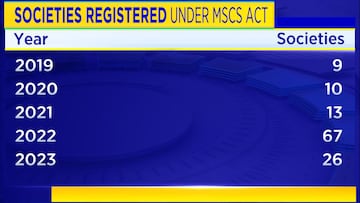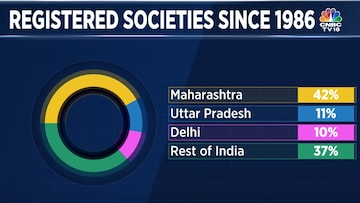
What Are Multi-State Cooperative Societies (MSCS)?
All co-operative societies, with objects not confined to one state, and serving the interests of members in more than one state come under its purview. The National Agricultural Cooperative Marketing Federation, Indian Farmers Fertilisers Cooperative, AMUL, British Council are some prominent examples.
According to the Ministry of Cooperation data, 1,401 multi-state cooperative societies have been registered since 1986. Of them, 250 MSCS were registered in 2014 alone, which is the highest in a calendar year, so far, followed by 247 in 2012. As many as 125 multi-state cooperative societies have been registered since 2019.

Approximately half the registered societies under the MSCS Act 2002 fall under the Credit sector. These include 67 cooperative banks as well. Agriculture, housing, dairy are the other prominent sectors.
Which state has the most number of registered multi-state cooperative socieites?
Maharashtra leads the way with 654 registered MSCS since 1986. The state accounts for close to 42 percent of multi-state cooperative societies across India. Uttar Pradesh with 163 registered MSCS is a distant second.

Government’s rationale behind the amendment bill
Union home minister Amit Shah, who is also the nodal minister for the ministry of cooperation, said the Cabinet had given its approval to the bill to increase the transparency, accountability and profit of multi-state cooperative societies.
The joint committee which studied the bill said there have been complaints in some of the multi-state cooperative societies about financial embezzlements, delay and disputes regarding holding elections, biased selection of auditors, and favouritism in recruitment, lack of active participation of members.
The statement of objects and reasons highlights some of the salient features of the amendment bill:
An election authority to conduct polls
The amendment bill authorises the Centre to set up an election authority comprising a chairperson, vice-chairperson and not more than three members to usher in reforms in the electoral process. The members shall hold office for three years or 65 years, whichever is earlier. They shall be eligible for re-appointment. Union home minister Amit Shah said that it will be an independent body similar to the Election Commission.
The authority shall:
The rationale behind the amendment can be traced to Article 243ZK(2) of the Constitution, which states "the superintendence, direction and control of the preparation of electoral rolls for the conduct of elections shall vest in an authority or body as may be provided by the legislature of the state, by law."
State-level cooperatives can merge
The amendment bill enables any co-operative society to voluntarily merge into an existing MSCS, subject to state laws. A resolution by not less than two-thirds of the members present and voting at a general meeting would do the job. The older version allows amalgamation of only multi-state cooperative societies. The Centre feels that this will help existing state cooperative societies improve their viability and achieve economies of scale.
Redemption of Centre/state shareholding in MSCS
The new amendment bill mandates prior approval to redeem Centre or state government’s shareholdings. No such permission was required earlier.
Fund to revive sick MSCS
Profit-making (for 3 financial years) multi-state cooperatives shall credit Rs 1 crore or 1 percent of their net profit, whichever is less to a fund meant for revival of sick MSCS.
Centre’s super powers
The 2002 Act gave the Central government the powers to supersede or suspend the board and appoint administrator(s) to manage affairs of ‘’specified multi-state cooperative societies.’’ However, it applied only to those MSCS where the Central government had a shareholding of 51 percent of paid-up share capital or total shares.
In the amendment bill, specified multi-state cooperative societies means ‘’any multi-State co-operative society where there is Government shareholding or loan or financial assistance or any guarantee by the Government.’’ So, essentially, the Centre’s super powers would potentially apply to more MSCS.
Concurrent audits
MSCS with annual turnover or deposit over the approved sum will be subjected to a concurrent audit. The government’s rationale is that it will ensure early detection of fraud or irregularities in the society and accordingly prompt course corrections can be taken.
Higher penalty for offences
The penalty imposed for furnishing false information has been increased to upto Rs 1 lakh from Rs 10,000. The monetary penalty amount for other offences has been hiked as well.
Complaint redressal
The amendment bill empowers the Centre to appoint one or more ombudsman to enquire into complaints filed by MSCS members.
Potential Conflict Areas
Also Read: Decoding the 'Uniform Civil Code' discourse
Check out our in-depth Market Coverage, Business News & get real-time Stock Market Updates on CNBC-TV18. Also, Watch our channels CNBC-TV18, CNBC Awaaz and CNBC Bajar Live on-the-go!



